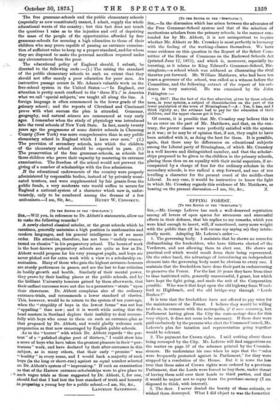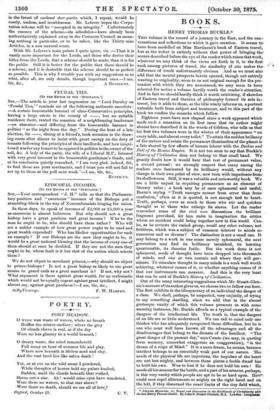EPPING FOREST.
[TO THIS EDITOR OF THE SPECTATOR."]
SIR,—Mr. George Lefevre has such a well-deserved reputation among all lovers of open spaces for strenuous and successful
efforts in their defence, that his replies to my remarks, which you were kind enough to insert, will, if unnoticeed, carry more weight with the public than (if he will excuse my saying so) they intrin- sically merit. Adopting Mr. Lefevre's order :— 1. The governing body. I maintain that he shows no cause for disfranchising the freeholders, who have hitherto elected all the Verderers, and not allowing them to elect one. He shows no practical evil which would result from their being represented. On the other hand, the advantage of introducing an independent element into the governing body must be obvious to every one. I maintain that the freeholders have done their part in endeavouring to preserve the Forest. For the last 50 years they have from time to time instituted suits, generally unsuccessful, I grant, but which have kept the fight going, and made the suit of the Corporation possible. Who was it that kept open the old highway from Wood- ford to Highbeach, and the old bridge-way through "Lords Bushes ?"
It is true that the freeholders have not offered to pay rates for the maintenance of the Forest. I believe they would be willing
to do so, in common with the metropolis, if it were necessary, but
Parliament having given the City the corn-metage dues for this very object, it does not seem to be necessary. If these dues were
paid exclusively by the persons who elect the Common Council, Mr. Lefevre's plea for taxation and representation going together would be relevant.
2. The payment for Crown rights. I said nothing about these being recouped by the City. Mr. Lefevre will find suggestions on the matter on page 37 of the schemes printed by the Commis- sioners. He understates his case when he says that the "sales were frequently protested against in Parliament," for they were
stopped by a resolution of the House. But it is none the less true that these sales of Crown rights were ordered by a previous Parliament, that the Lords were forced to buy them, under threat of having them sold over their heads to third parties, and that it would be unjust not to repay them the purchase-money (I am disposed to think, with interest).
3. The deer. I never denied the beauty of these animals, or wished them destroyed. What I did object to was the formation in the forest of enclosed deer-parks, which, I repeat, would be costly, useless, and troublesome. Mr. Lefevre hopes the Corpo- ration scheme will be "accepted in its integrity." Unfortunately the essence of the scheme—its schedules—have already been authoritatively explained away in the Common Council as mean- ing nothing in particular, or to be taken, like the Thirty-nine Articles, in a non-natural sense.
With Mr. Lefevre's main points I quite agree, viz. :—That it is vastly more important for the Lords, and those who derive their titles from the Lords, that a scheme should be made, than it is for the public. Still it is better for the public that there should be a scheme, and it is desirable that the scheme should be as perfect as possible. This is why I trouble you with my suggestions as to what, after all, are only details, though important ones.—! am,



































 Previous page
Previous page